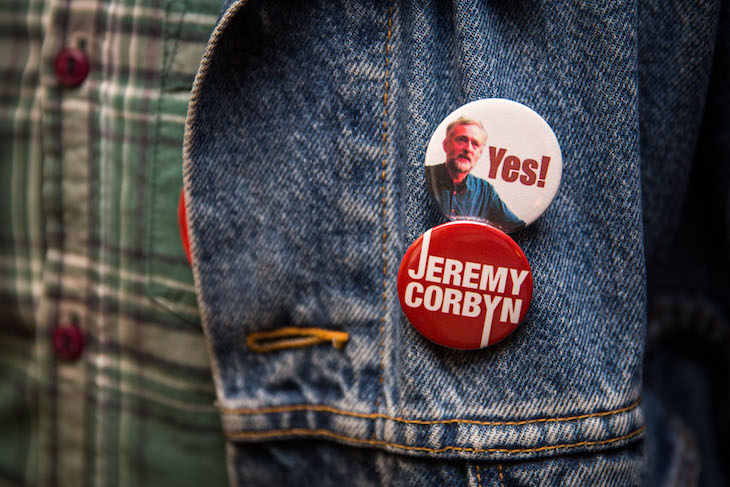Jeremy Corbyn has given up on winning this election and is currently struggling to ensure that on 12 December Boris Johnson will be denied a Commons majority. Last week Labour’s campaign strategy switched from trying to win seats to trying not to lose them, reflecting just how badly things are going. With polling day just around the corner, the party has been reduced to sending its chair Ian Lavery to visit once rock-sold northern seats to try and win back former miners to Labour.
It should not have been this way. Indeed, according to John McDonnell, Corbyn was just a week away from becoming Prime Minister in 2017. If only that election campaign had lasted just a little bit longer he would have entered Downing Street as the victor. Corbynites claim 2017 as a complete vindication of the man and his message. For a time, their giddy triumphalism knew no bounds, greeting the Labour leader at the party’s 2017 annual conference as ‘the absolute boy’ and chanting ‘ohhh, Jeremy Corbyn!’ to the White Stripes’ ‘Seven Nation Army’. Given Labour had just won 40 per cent of the vote, its best share since Tony Blair’s second landslide victory of 2001, Corbyn’s many critics in the Parliamentary Labour Party were reduced to silence. Yvette Cooper and Chuka Umunna even said they were prepared to serve in his shadow cabinet. With Labour not having won a general election since 2005, maybe Jeremy really had found a new way back to power?
The key Corbynite explanation for why Labour did so well in 2017 was communication. Corbyn’s leadership, anti-austerity policies and wider promise to reverse neo-liberalism were clearly important. But as Steve Howell, deputy to Seamas Milne during the election, has asserted: the key was Labour’s unprecedented ability to project its transformative message to the voters. This, he argues, was partly due to its social media presence, its 500,000 members knocking on voters’ doors and hugely enthusiastic rallies. But most importantly, Howell states, it was how Corbyn himself projected his message through television screens. While the press remained implacably hostile, once the general election was announced the broadcasters were forced to abide by rules which gave Labour a fair crack of the whip.
In preparing for this election, Labour strategists believed they would benefit from the same factors: broadcasters would have to treat Corbyn impartially and so viewers would be able to see how decent a man he was. And yet, the Corbyn magic does not appear to have worked this time.
For Corbynites, the explanation is easy to find. BBC journalists are part of a ‘rigged system’. Leading Corbynite outriders have now taken to tweeting pictures showing BBC journalists enjoying a drink with top Conservatives to make this point. Reflecting an emerging consensus on the hard-left, one Corbynite tweeter has even claimed the BBC ‘have so distorted our message as to be an affront to democracy’. Yet if broadcasters were part of a rigged system in 2017 and the system is still rigged in 2019, why is Labour doing so much worse?
The BBC’s director of news and current affairs has been forced to concede that the corporation has made a number of editorial mistakes during this campaign, most egregiously in failing to ensure Johnson was interviewed by Andrew Neil. But focusing on the BBC – and even Channel 4 news when it broadcasts a focus group full of ex-Labour voters who say they all dislike Corbyn – is an act of deflection, a term with which psychologists will be familiar. It is a mental tool used by narcissists to deny their own mistakes by projecting them on to other people. It means Corbyn and his cohorts can avoid any self-criticism even though they are responsible for a Brexit policy that pleases neither Leavers nor Remainers and a manifesto that contains an unprecedented number of huge financial commitments for which apparently only the richest five per cent will pay. For Corbynites, their message is correct – voters are not flocking to the party because their message has been uniquely distorted.
The polls might shift in Labour’s favour during the next few days. But right now they suggest that on 12 December Corbyn will have taken a big step back from 2017. Indeed, he could have retreated to the kind of vote share Labour held at the 2015 election, a campaign considered by some in the party to be the last gasp of a bankrupt Blairism. Blaming the media for their own failures is one way Corbynites hope to avoid Labour members seeing 2019 as representing the death of Corbynism.
Steven Fielding is Professor of Political History at the University of Nottingham and is writing ‘The Labour Party: from Callaghan to Corbyn’ for Polity Press, to be published in 2021






Comments